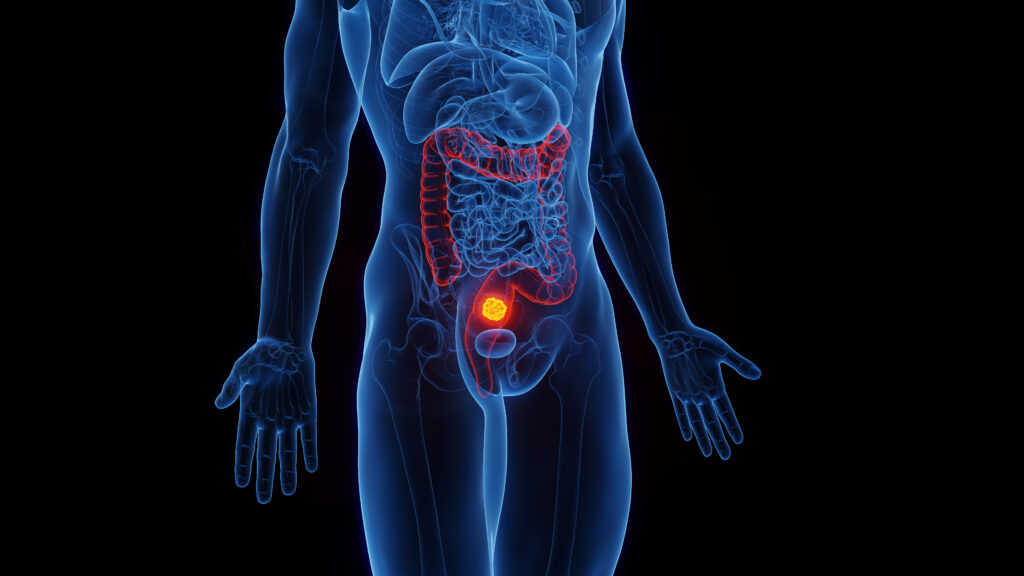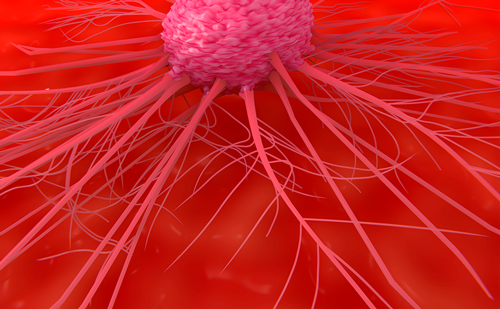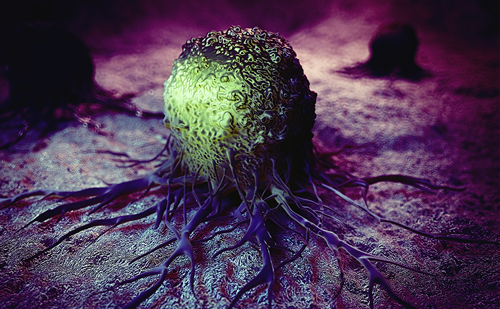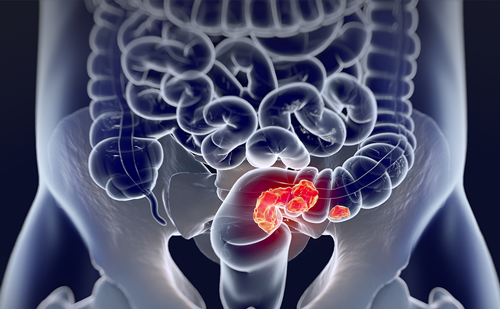Before the 1980s, rectal cancer was frequently treated with surgery alone, which resulted in high rates of local failure with significant patient morbidity and mortality. Randomized trials performed in the 1980s and 1990s demonstrated that adjuvant chemotherapy decreased rates of local failure and improved survival compared with resection alone.1,2 These observations led to the adoption of adjuvant radiation therapy and chemotherapy as the standard treatment in the US for patients with resected stage II–III disease. More recently, proponents of a more thorough and anatomical resection of the mesorectal tissues, i.e. the total mesorectal excision (TME) procedure, reported that local regional failure rates with this approach alone were <10%, questioning the necessity of radiation therapy. To answer this, a large randomized trial was undertaken in The Netherlands comparing neoadjuvant radiation therapy followed by TME with TME only. This trial showed that despite improved surgical techniques, radiation therapy resulted in a significant reduction in local failure (two-year local failure rate 2.4 versus 8.2%; p<0.001).3
These findings have been supported by the preliminary results of a Medical Research Council (MRC) trial evaluating pre-operative short-course radiotherapy versus selected post-operative combined modality therapy. In this phase III study, 1,350 patients with clinically resectable rectal cancer were randomized to short-course pre-operative radiation therapy (25Gy in 5Gy fractions) and TME versus TME followed by selective post-operative chemoradiation (45Gy in 1.8Gy fractions with 5-fluorouracil (5-FU)) in patients with tumor involvement of the circumferential resection margin. In addition, patients with stage III disease received post-operative adjuvant chemotherapy. In patients undergoing pre-operative radiation therapy, local recurrence was significantly reduced compared with selective post-operative chemoradiation (4.7 and 11.1%, respectively). Furthermore, the three-year disease-free survival rate was significantly improved in patients undergoing pre-operative radiation therapy (79.5 and 74.9%, respectively).4
These results suggest that even with TME and adjuvant chemotherapy, preoperative radiation improves outcomes over selective post-operativechemoradiation in patients with high-risk disease. Nonetheless, there may be selected stage II or III disease patients who can be treated with TME alone and, therefore, spared chemoradiation, including patients with upper rectal disease with minimal invasion beyond the rectal wall/no nodal involvement (T3N0), as well as disease confined to the rectal wall with minimal nodal involvement (T1–2, N1). However, given the lack of prospective data supporting this approach, further investigation and validation will be required before general recommendations can be made. Another area of controversy over several decades has centered on the sequencing of radiation therapy relative to surgery. Advocates of preoperativetherapy argued that this approach had many benefits, including enhanced rates of sphincter preservation, delivery of therapy to the tumor with an intact vasculature, and improved radiation tolerance. In Germany, a large randomized trial comparing pre-operative with postoperative radiation therapy and chemotherapy confirmed that a preoperative approach resulted in superior treatment compliance, less acute and late toxicity, improved rates of sphincter preservation in patients with low-lying tumors, and a significant improvement in local regional control,again simply by altering the sequence of chemotherapy in relationship to surgery.5 This has led to a new standard of care in the US and Europe in the treatment of stage II–III and selected stage IV rectal cancer patients.
The primary disadvantage of pre-operative radiation therapy and chemotherapy is the potential to irradiate patients with stage I (T1–2N0) disease, a subset of patients who have low rates of local recurrence when treated with TME alone with any benefit of radiation therapy limited. Therefore, careful pre-treatment staging with endoscopic ultrasound (EUS) and/or magnetic resonance imaging (MRI) is important. Despite this,there is still the potential to ‘upstage’ patients who have early-stage disease, as exemplified in the post-operative arm of the German rectal trial, where 18% of patients staged to have stage II/III disease by EUS preoperatively were found to have pathological stage I disease.5 The integration of thin-section MRI during the pre-therapy evaluation of rectal cancer patients will likely further refine accurate pre-therapy staging and potentially spare stage I patients from neoadjuvant therapy.Other trials have evaluated the importance of concurrent chemotherapy in the neoadjuvant treatment of rectal cancer. Several recent reports of European randomized trials have compared pre-operative radiation therapy with or without concurrent chemotherapy.6,7 While these trials have shown improvements in local control and response rates with concurrent chemotherapy and radiation therapy, no survival advantage has been observed. This is in contrast to earlier trials comparing adjuvant radiation therapy alone with combined chemoradiation therapy.
What has become clear with the contemporary treatment approach of preoperative radiation therapy and chemotherapy and TME is that local regional failure has become increasingly uncommon, with most series reporting rates<10%. The dominant pattern of failure following treatment in rectal cancer is now distant relapse. More recently, the introduction of newer chemotherapeutic (capecitabine, oxaliplatin, irinotecan) and targeted (bevacizumab, cetuximab) agents in patients with metastatic colorectal cancer has led to improvements in disease-free and overall survival. Therefore, the integration of these agents into the neoadjuvant therapy of rectal cancer is a logical step. The goal of combining these agents with radiation therapy is to further increase rates of tumor downstaging and sphincter preservation, local control, and survival through improved tumor radiosensitization.Another potential goal would be to identify regimens associated with high pathologically complete response rates, with the possibility of avoiding resection in highly selected patients achieving good clinical response. However, until higher pathologically complete response rates can be reproducibly achieved and improved and predictors of response identified, surgery will remain an integral component of the treatment of rectal cancer in the vast majority of patients. In summary, neoadjuvant radiation therapy and chemotherapy combined with TME has now become a standard treatment for locally advancedrectal cancer in the US and Europe. With this approach, local regional failure rates should be less than 10%. The development of distant metastases is now the predominant mode of failure in this disease, emphasizing the need for improved systemic therapies. Based on the positive data in metastatic colorectal cancer and synergy with radiation therapy in pre-clinical models, there is a strong rationale to integrate newer-generation cytotoxic chemotherapeutics and targeted therapies into the neoadjuvant therapy of rectal cancer. These agents are now being incorporated into the testing of new strategies in this disease,with goals of further enhancing tumor downstaging, local control, metastases-free survival, and long-term survival. Phase I and II studies have been completed evaluating these approaches, and it appears that the combination of these agents with radiation therapy delivered neoadjuvantly can be carried out safely with improvedresponse rates. Ongoing and planned American and European phase III trials will help further determine the tolerability and ultimate efficacy of these regimens. Current management questions include the following: Is surgery necessary after chemoradiation in all patients, and are there subsets of patients more likely to benefit from the addition of surgery than others? Conversely, is radiation therapy necessary in all patients, and are there subsets of patients more likely to benefit from the addition of radiation than others? Can the introduction of newer chemotherapy/targeted agents in the neoadjuvant setting improve the results over ‘standard’ chemoradiation with 5-FU? Will new radiation technologies such as 3D conformal therapy, positron emission tomography (PET)-based planning, intensity-modulated radiation therapy, proton therapy, and image-guided radiation therapy decrease complication rates and influence cure rates?Will the identification of molecular prognostic markers allow ‘individualization’ of treatments among patients? These and other topics will be the subject of future investigations in the management of this disease.












